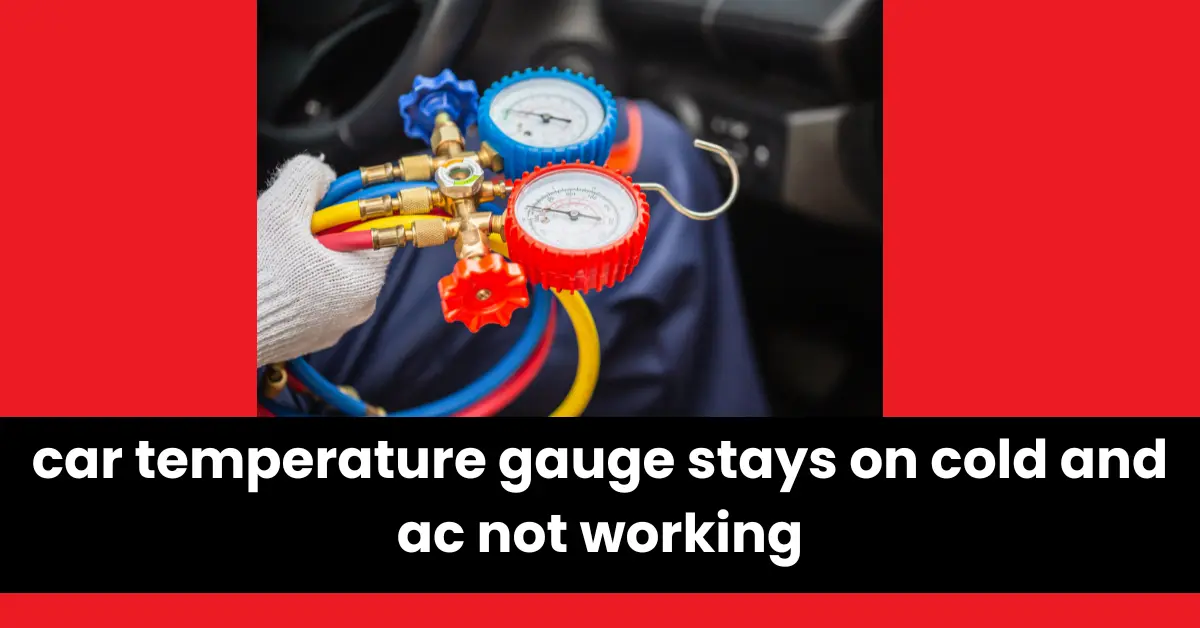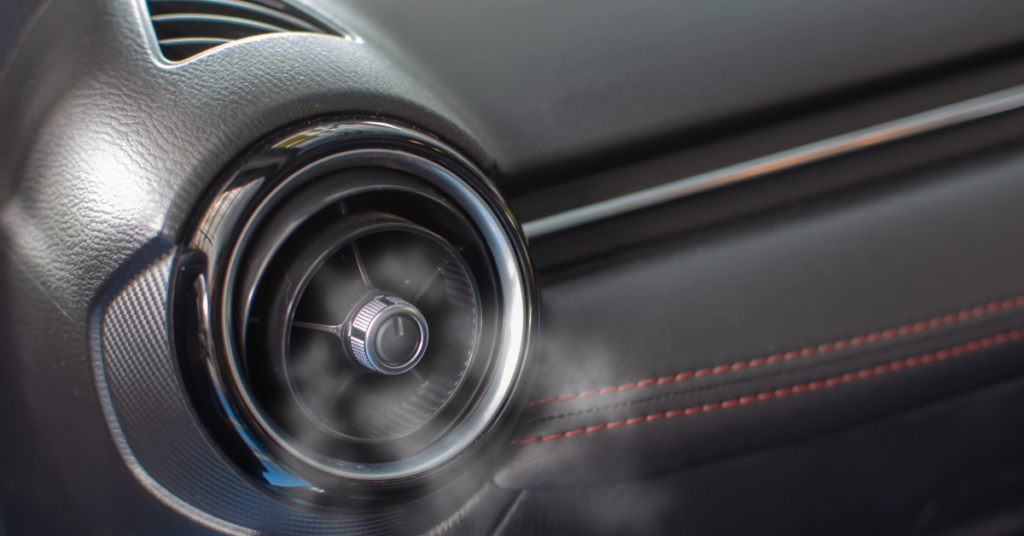
One of the most frustrating issues that car owners may encounter is when the temperature gauge stays on cold and the AC (air conditioning) system fails to work, especially during hot summer days or when the weather is unbearable.
In this article, we will explore the possible causes of this problem and provide effective solutions to help resolve the issue.
Contents
Understanding the Temperature Gauge and AC System
Before delving into the potential causes, let’s first gain a brief understanding of how the car’s temperature gauge and AC system function.
Temperature Gauge
The temperature gauge in your car is designed to measure the coolant temperature in the engine. Its primary role is to ensure that the engine stays within the optimal operating temperature range.
If the gauge consistently stays on the cold side, it can indicate that the engine is not reaching the normal operating temperature.
Monitoring the engine’s temperature is crucial as it helps prevent overheating, which can lead to severe engine damage. The temperature gauge provides a visual representation of the engine’s temperature, allowing you to take appropriate action if any abnormalities are detected.
AC System
The AC system in your car plays a vital role in cooling the interior of the vehicle. It operates by circulating refrigerant through various components such as the compressor, evaporator, condenser, and expansion valve.
The refrigerant absorbs heat from the cabin and releases it outside, thereby providing a cool and comfortable environment.
If the AC system is not functioning properly, it may result in warm or no air blowing from the vents. This can be particularly troublesome during scorching hot weather, making it essential to identify and rectify any issues promptly.
Car Temperature Gauge Stays on Cold and AC Not Working | Possible Causes & Solutions
Now that we have a better understanding of the basics, let’s explore some potential causes and effective solutions for when the temperature gauge stays on cold and the AC system fails to work.
Low Coolant Level

One of the common reasons for these issues is a low coolant level in the engine. Insufficient coolant can prevent the engine from warming up properly, which in turn causes the temperature gauge to stay on the cold side.
Additionally, the lack of coolant can also affect the performance of the AC system.
Solution
To address this issue, it is important to check the coolant level in the radiator or coolant reservoir. If the coolant level is below the recommended range, it is necessary to top it up with the appropriate coolant mixture.
It is crucial to follow the manufacturer’s guidelines regarding the correct coolant type and mixing ratios to ensure optimal performance.
Regularly monitoring the coolant level and maintaining it within the recommended range is essential for the proper functioning of both the engine and the AC system.
Faulty Thermostat
Another potential culprit could be a faulty thermostat. The thermostat plays a critical role in regulating the flow of coolant through the engine.
When the engine reaches the optimal operating temperature, the thermostat opens, allowing the coolant to circulate and maintain a stable temperature.
However, if the thermostat fails to open at the right temperature, it can prevent the engine from reaching the optimal operating temperature, resulting in a cold temperature gauge reading. Moreover, a faulty thermostat can also affect the proper functioning of the AC system.
Solution
If you suspect a faulty thermostat, it is advisable to have it inspected and replaced if necessary by a qualified mechanic.
A professional mechanic will be able to accurately diagnose the issue and ensure that the thermostat is functioning correctly, allowing the engine to reach and maintain the appropriate temperature.
Malfunctioning Temperature Sensor
A malfunctioning temperature sensor can also lead to incorrect temperature gauge readings. The temperature sensor is responsible for providing accurate information to the gauge, allowing it to display the engine’s temperature.
If the sensor fails to provide accurate readings, it may show a constant cold reading on the gauge. Similarly, a faulty temperature sensor can also affect the performance of the AC system.
Solution
In the case of a malfunctioning temperature sensor, it is recommended to have a professional mechanic diagnose and replace the sensor if required.
A qualified mechanic will have the necessary expertise and tools to accurately diagnose any issues with the temperature sensor and ensure its proper functioning.
Cooling System Issues

Various cooling system issues, such as a malfunctioning water pump or a clogged radiator, can also cause the temperature gauge to stay on cold and the AC system to malfunction.
A faulty water pump may result in inadequate circulation of coolant, while a clogged radiator can impede proper heat dissipation.
Solution
To address cooling system issues, it is highly recommended to consult a professional mechanic. They will be able to assess the cooling system thoroughly and identify any underlying problems.
Whether it’s a faulty water pump, a clogged radiator, or any other issue within the cooling system, a professional mechanic will have the expertise to address and resolve the problem effectively.
Electrical Issues
In some cases, electrical issues can be the culprit behind the temperature gauge and AC system problems. Faulty wiring, blown fuses, or a malfunctioning control module can disrupt the proper functioning of these systems.
Solution
If you suspect electrical issues as the cause of the problem, it is advisable to have an experienced auto electrician inspect and repair any potential electrical problems.
Auto electricians specialize in diagnosing and resolving electrical issues in vehicles, ensuring that the temperature gauge and AC system function correctly.
Other Factors
There are a few other factors that may contribute to the temperature gauge staying on cold and the AC system not working. These can include a faulty AC compressor, a refrigerant leak, or a malfunctioning AC control panel.
Solution
Given the complexity of these issues, it is best to have a professional mechanic diagnose the specific problem.
A qualified mechanic will be able to accurately identify the underlying cause and undertake the necessary repairs or replacements.
They will ensure that the AC compressor, refrigerant levels, and AC control panel are functioning correctly, restoring the proper operation of the AC system and resolving any temperature gauge abnormalities.
Conclusion
Experiencing a car temperature gauge staying on cold and the AC system not working can be frustrating, but it is important not to overlook these issues. Ignoring them can lead to potential engine damage or discomfort during hot weather.
By understanding the potential causes and solutions mentioned in this article, you can take the necessary steps to resolve the problem. However, it is always advisable to consult a professional mechanic for accurate diagnosis and expert assistance in resolving these issues.
FAQs
Why does the temperature gauge stay on cold in my car?
The temperature gauge in your car may stay on cold if there is a low coolant level in the engine or if the thermostat is faulty. Other potential causes include a malfunctioning temperature sensor, cooling system issues, or electrical problems.
What should I do if the temperature gauge stays on cold?
If the temperature gauge stays on cold, it is important to first check the coolant level in the radiator or coolant reservoir. If the coolant level is low, it should be topped up with the appropriate coolant mixture.
If the coolant level is sufficient, it is advisable to have a professional mechanic inspect and potentially replace the thermostat or diagnose any other underlying issues.
Why is my AC system not working in my car?
The AC system in your car may not be working if there is a low coolant level, a faulty thermostat, or a malfunctioning temperature sensor. Other possible causes include cooling system issues, electrical problems, a faulty AC compressor, a refrigerant leak, or a malfunctioning AC control panel.
How can I resolve the issue of the AC system not working in my car?
To resolve the issue of the AC system not working, it is recommended to consult a professional mechanic. They will be able to diagnose the specific problem and undertake the necessary repairs or replacements.
This may involve addressing cooling system issues, electrical problems, or checking the AC compressor, refrigerant levels, and AC control panel.



